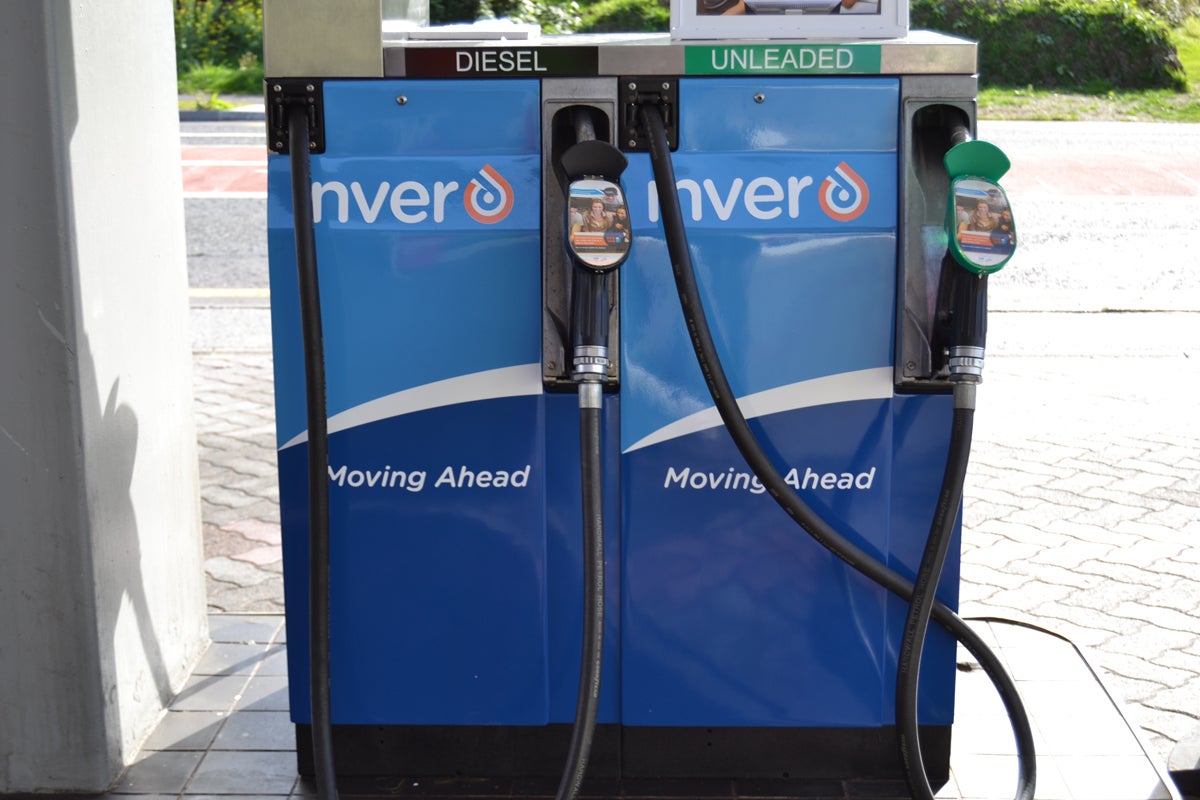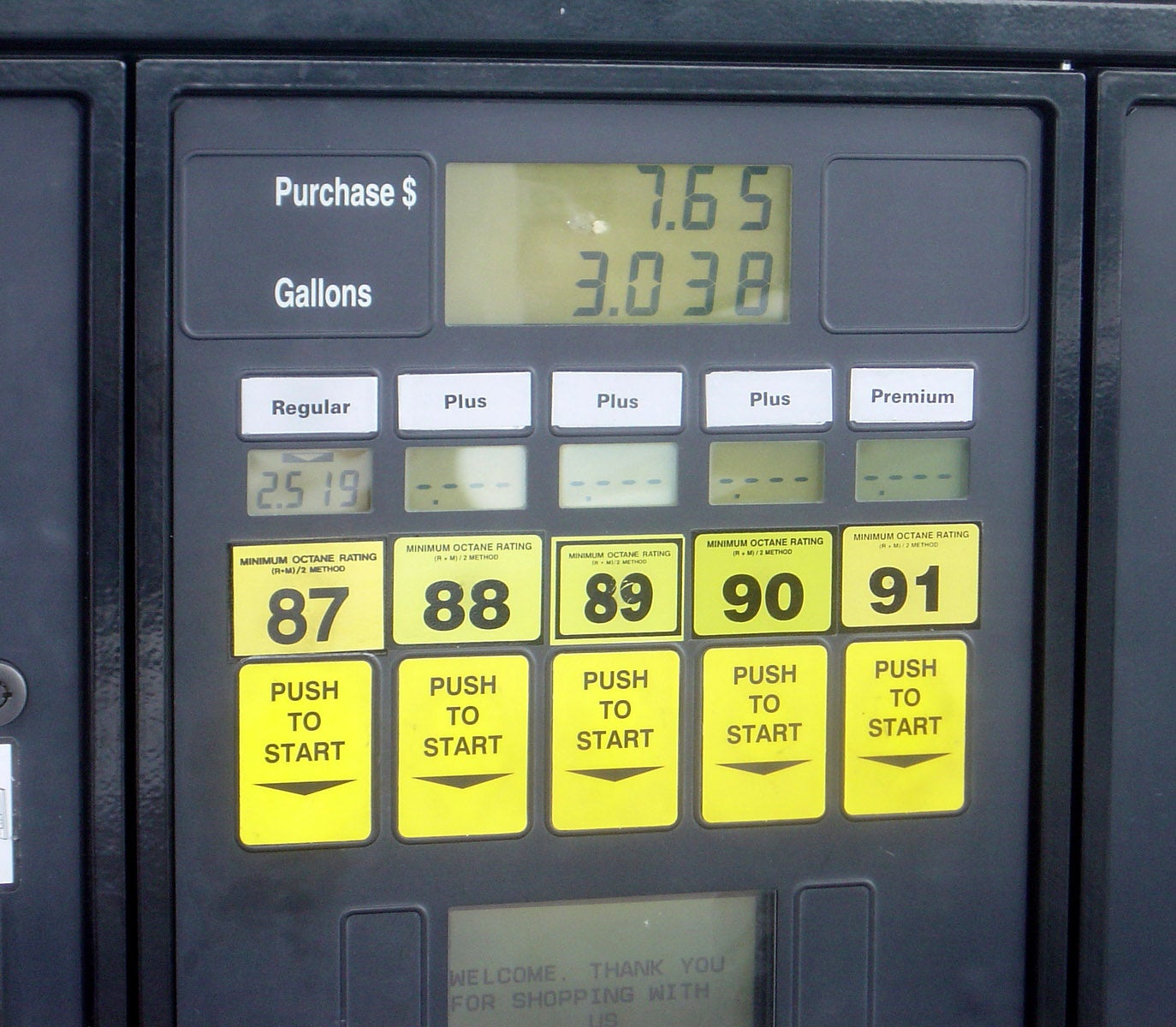 "TouringBubble" (TouringBubble)
"TouringBubble" (TouringBubble)
01/12/2015 at 11:19 • Filed to: None
 2
2
 12
12
 "TouringBubble" (TouringBubble)
"TouringBubble" (TouringBubble)
01/12/2015 at 11:19 • Filed to: None |  2 2
|  12 12 |
Recently, Mental Floss posted a YouTube video covering !!!error: Indecipherable SUB-paragraph formatting!!! . While I love this video series, I have to take issue with their take on fuel octane. While they weren't technically wrong, they left out some key points I feel someone should know before pumping a tank full of 87 into their AMG Mercedes.
First, let's start with what fuel octane is. Fuel octane is the measurement of, essentially, how stable a fuel burns. The higher the octane, the more stable the fuel will be, especially when under the stress of compression.
In the US, octane is measured using the Anti-Knock Index (AKI), using the formula of (R+M)/2. The R and M represent RON and MON, two other values that measure knock resistance. In other countries, the fuel may be rated only in RON or MON values.
Using a higher octane fuel helps prevent knock, or detonation, during the combustion process. Engines that are designed for higher performance generally require higher octane fuel to reach the numbers that a manufacturer states.
So, let's get to the points in the video ...
Mental Floss states that there isn't a need to run high octane fuel in your engine if you don't need to use all of the power available. They quote someone from AAA who basically says that if you aren't towing or racing, you can run lower octane. While this is all partially true, I feel that some key details are left out.
It's completely true that if a performance engine is never under stress, it doesn't really need the high octane fuel. So, for your grandma that only drives to church on Sundays and never makes it over 30 mph, sure. But the average driver does put engines under stress on occasion for things like accelerating on to the highway or passing other cars. When your right foot goes down, that need for higher octane fuel shows itself.
So, let's talk about what happens when you fill up on 87 in your turbocharged Audi and floor it to pass that loser hogging the left lane.
There is a knock sensor mounted on the engine of modern vehicles that listens for specific frequencies that will tell the ECM that something is wrong. Immediately, the engine will lower the ignition timing to protect the engine from harm. If the knock is significant enough, or continues over time, the ECM will move to more drastic measures, adding more fuel and decreasing timing even further.
These changes made by the ECU do reduce the power output of the engine to prevent detonation, and essentially de-tune it to run on lower octane fuel. The ECM will even remember the issue and keep the fuel mix rich and timing reduced to prevent it from happening again.
But here is the catch ... these systems are designed to catch small, limited duration events. Your mom accidentally putting 87 in your tank, or getting a tainted tank of gas. They aren't designed for long-term correction of continuous use of low octane fuel.
What happens is that the next time you accelerate a little and the engine doesn't see knock, the ECM will try to move back to it's normal operating mode, taking out a little fuel and increasing timing a degree at a time or so. If you're still running on 87, you'll move right back to a knocking engine. Depending on your driving habits, it's entirely possible to get the ECM back to fully expecting nice, high octane fuel again and then encounter severe knock when you floor it to pass that loser that's STILL hogging the left lane.
So, while the car "learns" and adapts to the fuel it's currently running, it's not meant to be a long term solution.
But, what is "knock," exactly, and why should you care about it in the first place?
Knock, or detonation, means that the fuel mixture in the cylinder burns inconsistently. This causes the pressure waves created by the fuel burn to spike, creating high-pressure areas in the cylinder. Each of these knock events stress your engine beyond it's intended design.
At best, detonation events will cause small pock marks on your piston and valves. As these build up over time they can cause hot spots in the cylinder, which can lead to larger failures. If a single detonation event is bad enough, it can cause immediate failure of engine components.
Basically, that 87 octane is causing near constant, uncontrolled micro explosions in your engine, instead of the smooth, controlled burn that the manufacturer intended and designed for.
So, when is it okay to run a lower octane fuel?
I can think of a few examples of acceptable times to run a lower octane fuel in your performance engine:
If the engine has been retuned to properly run on lower octane fuel
If you never plan to load the car with people, pass, accelerate briskly, race or tow
If you are in a place where 91+ octane fuel doesn't exist
You get new cars every 8 months and don't care about slowly killing your engine
Basically, if you spend the money for the nicer car or upgraded engine option that runs on premium fuel, just put premium fuel in it.
Is it a money thing? Premium usually costs about $0.40 more per gallon than regular. That's $6 more to fill up a 15 gallon tank. If you don't have $6, maybe you shouldn't have sprung for the turbocharged Kia and stuck with the base model Optima.
While we're talking about that $6 ... let's revisit the earlier point of the corrections made by the ECM to richen the fuel mix when knock is detected. This doesn't affect closed loop (idle and light cruise) operation much, but any time you're running in open loop (cruising at higher speeds, passing, loading the engine with towing/heavy loaded car, going up a hill, etc), you're using more fuel than you would be if the engine was performing correctly. The change in ignition timing is also altering how clean the fuel is burning, likely prematurely wearing out catalytic converters and increasing emissions.
So, in closing, yes, you can run your Volvo SUV on regular fuel. It will start and run and get the kids to soccer practice. But, as soon as you demand much performance from the engine, it will slowly begin to destroy itself. If you plan to hold on to the vehicle for a while ... it's worth it to spend the $6 and fill up with premium.
Just please, know the facts before you blindly follow internet advice.
 505Turbeaux
> TouringBubble
505Turbeaux
> TouringBubble
01/12/2015 at 11:28 |
|
also slight MPG benefits with premium as well. I agree, if you want to rock out the 87, buy the Hyundai, not the Mercedes
 KusabiSensei - Captain of the Toronto Maple Leafs
> TouringBubble
KusabiSensei - Captain of the Toronto Maple Leafs
> TouringBubble
01/12/2015 at 11:29 |
|
All of these things apply to *high relative compression* engines, either due to design (i.e. most N/A BMW engines), or because the intake is pressurized. This is due to the possibility of localized hot spots in the combustion chamber.
So, let's talk about what happens when you fill up on 87 in your turbocharged Audi and floor it to pass that loser hogging the left lane.
That's easy. The turbos will let go, and necessitate pulling the entire engine to replace them.
And the CEL will start blinking, and you will get misfires as well, and your turbo Audi will hate you.
Source: I track an S4 with the 2.7T engine.
 ADabOfOppo; Gone Plaid (Instructables Can Be Confusable)
> TouringBubble
ADabOfOppo; Gone Plaid (Instructables Can Be Confusable)
> TouringBubble
01/12/2015 at 11:30 |
|
I had always thought detonation was when the fuel-air mixture ignited too early.
Your description of unstable doesn't clearly explain that.
That's why the ECU retards timing, to make ignition happen later when the mixture can't be compressed enough for the piston to reach TDC before it ignites.
Knock in other words is the air-fuel mixture igniting as the piston is still traveling up the compression stroke. You're right about it being horrible for your engine. It's like trying to walk into a bar and someone punching you in the face just before you reach the door.
 jariten1781
> TouringBubble
jariten1781
> TouringBubble
01/12/2015 at 11:30 |
|
MentalFloss pumps out a lot of misleading or sometimes straight up wrong 'facts'. I like the show alright, but rarely is there an episode where at least one 'fact' doesn't make me go 'um...not really'. I think they just have their interns cruise the internet looking for interesting things then do a really cursory check and run with it. The hosts often pronounce or use terms wrong so it's obvious they just read from sheets and don't interview folks who actually know the subject matter.
For the general public the answer should probably always just be 'run what your manual says'.
 TouringBubble
> ADabOfOppo; Gone Plaid (Instructables Can Be Confusable)
TouringBubble
> ADabOfOppo; Gone Plaid (Instructables Can Be Confusable)
01/12/2015 at 11:32 |
|
It's my understanding that what you are describing is a specific type of detonation called "pre-ignition." It's the worst kind. You can have minor detonation events after the fuel ignites at the proper time but the cylinder pressure spikes during the burn.
 Cé hé sin
> TouringBubble
Cé hé sin
> TouringBubble
01/12/2015 at 11:32 |
|
There are times when I welcome the fact that when I go to a pump I'm confronted with:

!!! UNKNOWN CONTENT TYPE !!!
Rather than:

!!! UNKNOWN CONTENT TYPE !!!
 44444444444
> TouringBubble
44444444444
> TouringBubble
01/12/2015 at 11:36 |
|
Yep. Minimum of 89 in the XC70 and only 91+ (93 preferred) in the V70R. Don't forget the fuel economy difference between the two overcomes the added cost. I've caluated it at 3mpg less in the XC70. That's about another 50 miles before filling up. No idea what it is in the R because I won't put anything but super in.
 ADabOfOppo; Gone Plaid (Instructables Can Be Confusable)
> TouringBubble
ADabOfOppo; Gone Plaid (Instructables Can Be Confusable)
> TouringBubble
01/12/2015 at 11:37 |
|
Okay.
I still agree with your point and run BP 93 exclusively in my "Premium Fuel Required" 2002 SVT Focus. When gas was $4+ I just stopped looking at the prices. I need premium, so I am going to fill up. It's not really all that much more per tank.
What bugs the crap out of me is people who buy a luxury car and refuse to run the required octane. Clearly you can afford the car. Buy the right kind of gas too, asshats.
 TouringBubble
> ADabOfOppo; Gone Plaid (Instructables Can Be Confusable)
TouringBubble
> ADabOfOppo; Gone Plaid (Instructables Can Be Confusable)
01/12/2015 at 11:54 |
|
That bugs me too. There seems to be a point of diminishing returns when it comes to giving a crap compared to annual income. When you save up every penny to buy a used M3 you treat it different than buying a brand new CL63 with two months salary I guess.
 philipilihp
> TouringBubble
philipilihp
> TouringBubble
01/20/2015 at 10:57 |
|
Speaking of misconceptions, didn't Torch just have a whole article regarding warming up the car? So I would call that partially a misconception and partially true. No need to 10 min of warming up, but 30 sec. - 1 min. sounds pretty reasonable.
 Bolt-ActionBlunderbuss
> Cé hé sin
Bolt-ActionBlunderbuss
> Cé hé sin
01/20/2015 at 11:47 |
|
Unleaded as green? I assume that's not in the states is it?
 Cé hé sin
> Bolt-ActionBlunderbuss
Cé hé sin
> Bolt-ActionBlunderbuss
01/20/2015 at 13:04 |
|
Nope.